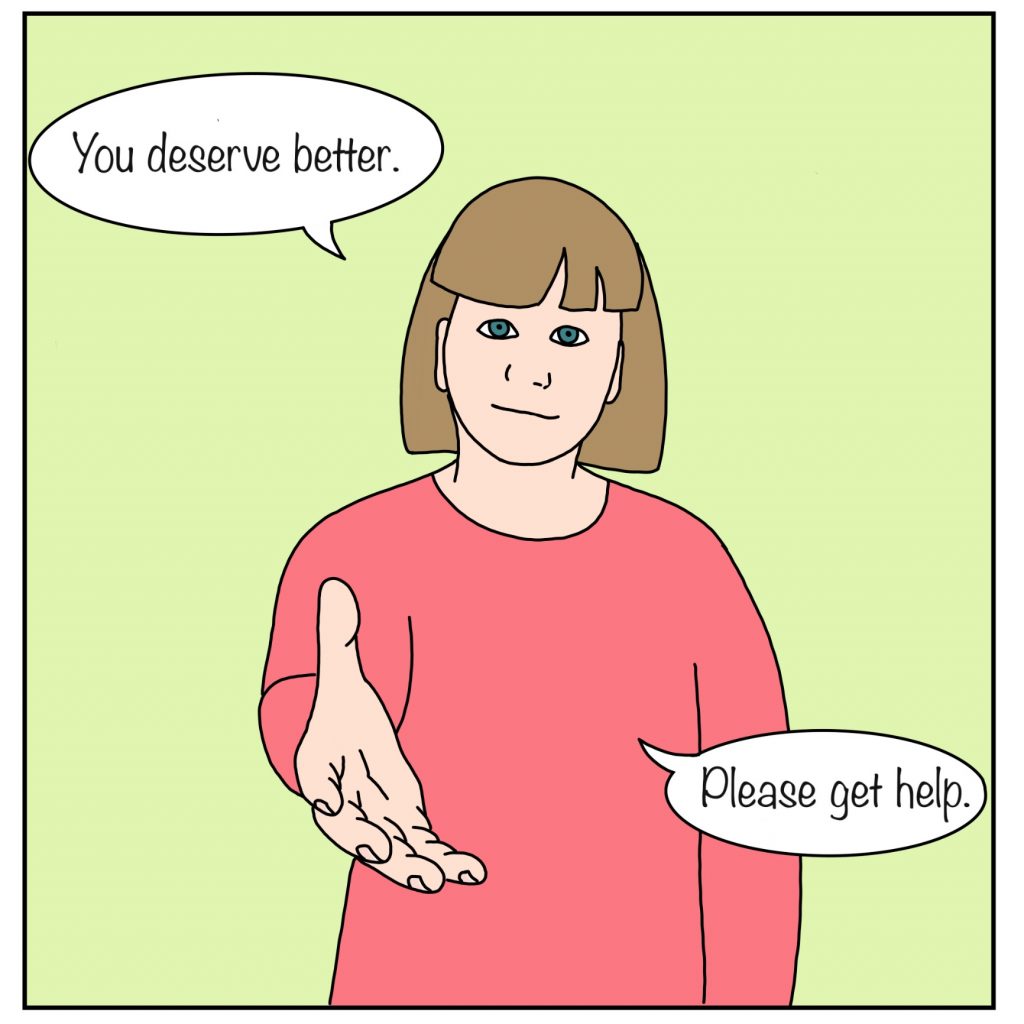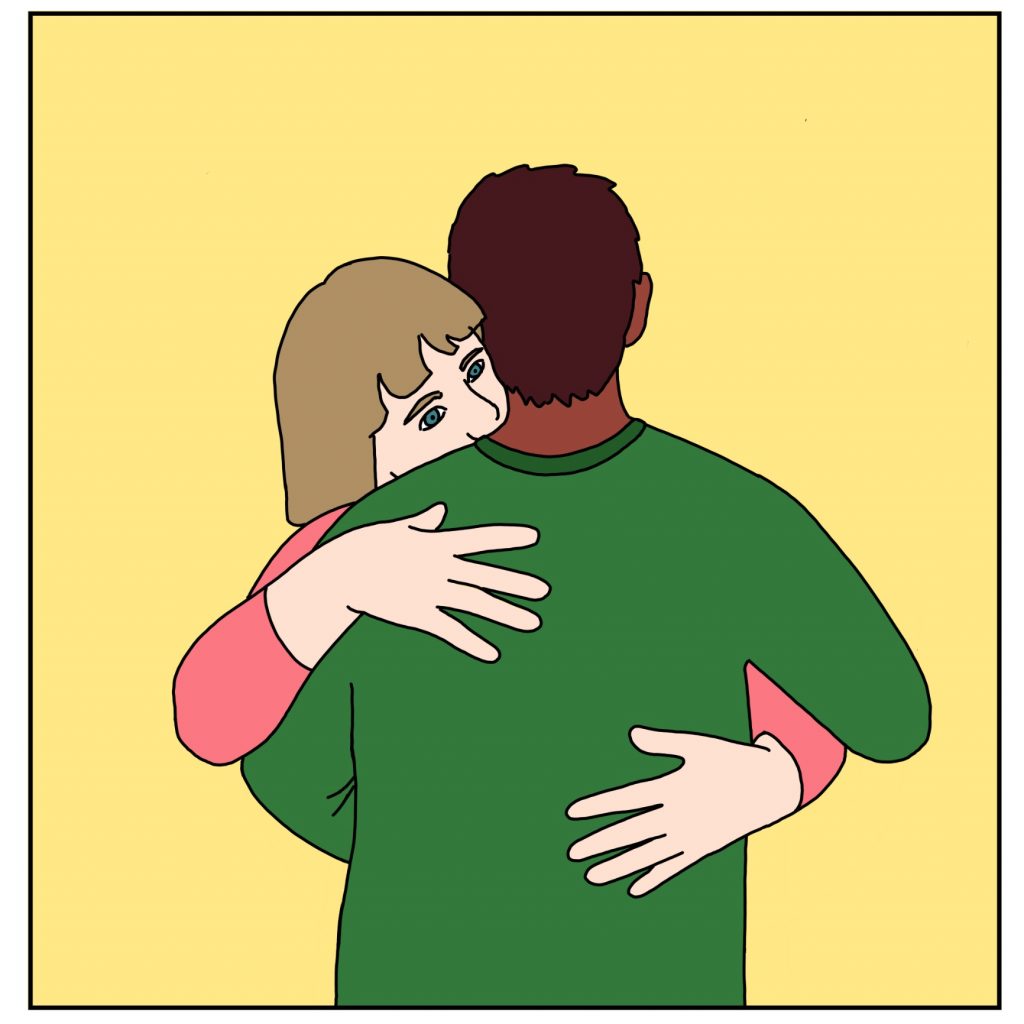3. What to do if you notice Self-Harm?
The first two parts were very much about me. “Write what you know”, they say.
The third part will be about you.
Before this part starts properly: I am not a psychiatrist, psychologist, or therapist. I am not a doctor or a lawyer. I am just a person with personal experience, speaking only from that perspective. I cannot give legal or medical advice.
What I can do, though, is tell you about my experience and about what I believe would have helped me. Maybe these could be a point to get you started.
Do you harm yourself in any way?
If at some point during reading you thought “I do that, too,” or “I am not doing that, but something comparable,” it is quite possible that you are not treating yourself as well as you deserve.
I do not have to know you or anything about you in order to know that you deserve better.
I know how it is to feel flawed, wrong, twisted.
It took me a long way to see that I do not deserve pain or neglect, but support and a chance to heal.
What can you do?
Seek help.
Depending on what you are doing, seek professional help.
If you are cutting, burning, or bruising yourself: call a hotline or seek out a psychiatrist, psychologist or therapist. Now is better than later.
You deserve help.

If it is “just” bad habits: get help, too. A hotline, parents, friends, self-help groups, online community, whatever is in reach. Get started somewhere.
You deserve help.
What helped me?
First, I had to admit that things were not getting better on their own. I had to admit I needed help. And I had to accept that I deserved help.
I have been to therapy and will apply for more because some things need maintenance.
My psychiatrist and I have tried out various kinds of medication until we found something that lets me be myself while still taking the edge off of depression.
I have learned to be (more) honest with myself and worked hard to accept being loved.
I have learned to forgive myself for not being perfect.
I have learned that it is not my fault that I am the way I am and that I can get better.
Do you see evidence of self-harm in others?
For this part, I am assuming you want to help, not make it worse.
Most important bit: Do not give the person in question grief about it. Do not make them feel guilty for their coping mechanism. No one chooses this way because they think it is easier or cooler or more fun. People find themselves on this path because they felt they had nowhere else to go.
What can you do?
That depends on your relation to the person and also the legal situation.
Make sure they know that you are a safe person.
Make sure to step in in case of bullying, microaggressions or any form of discrimination.
Make sure to provide information in a non-condescending manner on where or how to get help.
If legally required: tell the parents or legal guardians or some authorities. This might not be fun or easy and it might temporarily taint your relationship. The well-being of the person in question is more important than whether you are looking like the good one in their eyes. A good friend should care enough to get into trouble for seeing their friend get the help they need.
Unless you are a psychiatrist or therapist: do not try to take the place of one. You can be a friend, a confidante, an ally, part of a support net. You cannot give medical advice.
What would have helped me?
Good question.
It would have helped me if someone had taken my side. Not as in telling the bullies that they should leave poor tiny me alone, as that would probably have made me feel even worse.
Someone who dared to be seen socializing with me. Someone who dared treating me like a person. Someone who was not afraid of them.
For example, when I touched something at school, like moving a chair out of the way, the next person first wiped the part I touched down with a sleeve or something before touching it, too. No one made fun of that. No one came over to lay a hand on my arm or whatever to show that they were unafraid of contagion. One time a girl told me, where no one could see it, that I needed to stand up against the bullies. But she, too, was too afraid to say that out loud in public. There was no one on my side.
Maybe it would have helped me if someone had been convincingly interested in how I was feeling, giving me room to explore this question.
I never felt like I could talk about this with my parents, from whom I hid the evidence of cutting myself. With pale skin it was hard even later to pick out the only slightly paler scars before the faded. When I had fresh cuts I either wore long sleeves or, if the cuts were close to the wrist, a bandage, saying that I fell and hurt my wrist and used the bandage as support. I was occasionally clumsy, so it was believable. I did not want to burden my family with my problems. If someone had sat down with me, just the two of us, two cups of tea and the question “how are you doing dear?” maybe with “I remember that school could be hard sometimes”, maybe I could have opened up a bit, but I am not sure.
I once accidentally left my very bad poetry about wanting to die out in the open, on the kitchen table. My mother and sister found it and were reading it when I came in. I remember being extremely scared and embarrassed. I played it cool, denying all relevance of said bad poetry and slowly ran off to my room. Maybe half an hour later would have been a good time for a talk. But at that time, I had already been pretty good at masking how I feel and laughing suspicions away, so maybe I was just too convincing for my own good.
It would definitely have helped me if we had a society in which everyone could be themselves, not judged against some imaginary blueprint of how they are supposed to be.

In the meantime, we will have to do what we can to look out for one another. And we need space to talk about how we feel. Without fear of being judged for how we cope.